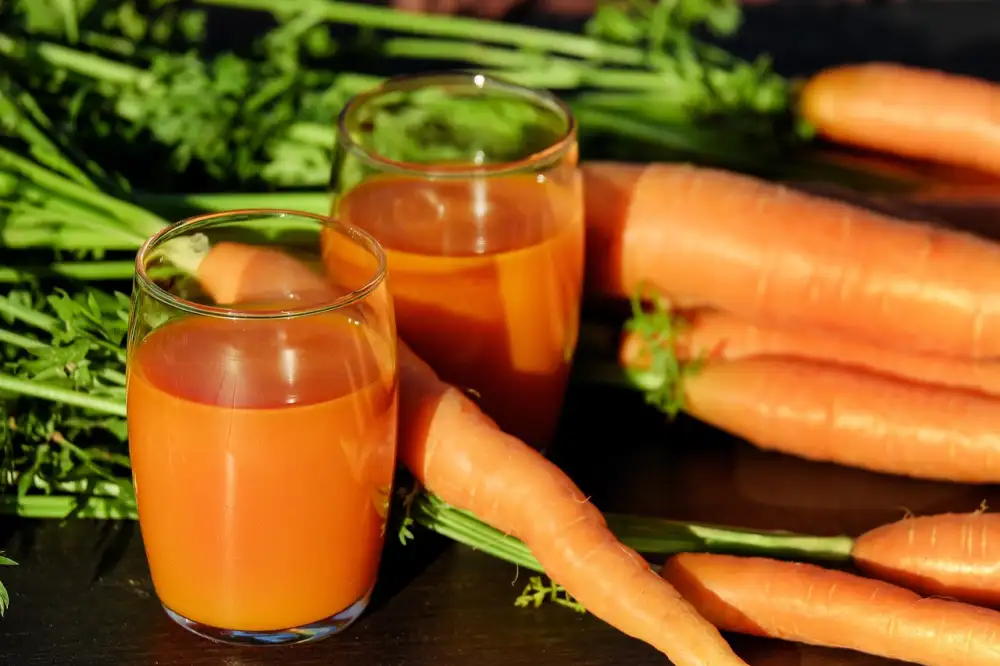Revitalize Your Health with a Juice Diet: Discover the Benefits of Juicing for a Healthy Lifestyle

Are you looking for a simple and effective way to revitalize your health? Look no further than the juice diet! Juicing has gained popularity in recent years as a powerful tool for achieving a healthier lifestyle. By incorporating fresh fruits and vegetables into your daily routine, you can nourish your body with essential nutrients and experience a wide range of health benefits. In this article, we will explore the advantages of the juice diet, how it works, types of juices to include, tips for success, potential risks, and frequently asked questions. Get ready to embark on a journey towards better health with the juice diet!
Benefits of the Juice Diet
The Juice Diet offers numerous benefits for those looking to revitalize their health. Firstly, it provides a convenient and easy way to consume a variety of fruits and vegetables in one sitting. This ensures that you receive a wide range of essential vitamins, minerals, and antioxidants that are crucial for maintaining optimal health.
Additionally, the Juice Diet can aid in weight loss as it is low in calories while still providing essential nutrients. By replacing high-calorie meals with nutrient-dense juices, you can create a calorie deficit and shed excess pounds.
Furthermore, juicing helps to detoxify the body by flushing out toxins and promoting better digestion. The high water content in juices helps to hydrate the body and support kidney function, which is vital for eliminating waste products.
Another benefit of the Juice Diet is its potential to boost energy levels. The natural sugars present in fruits provide an instant energy boost without the crash associated with processed sugars. This can lead to increased productivity and improved overall well-being.
Lastly, the Juice Diet has been linked to improved skin health. The abundance of antioxidants found in fruits and vegetables can help combat free radicals that contribute to premature aging and skin damage. Regular consumption of fresh juices can result in a clearer complexion and a youthful glow.
In summary, the Juice Diet offers a multitude of benefits including increased nutrient intake, weight loss support, detoxification, enhanced energy levels, and improved skin health. Incorporating this diet into your lifestyle can lead to significant improvements in your overall well-being.
How the Juice Diet Works
The juice diet is a popular method for detoxifying the body and promoting weight loss. It works by replacing solid meals with fresh, nutrient-rich juices made from fruits and vegetables. These juices are easily absorbed by the body, providing it with essential vitamins, minerals, and antioxidants.
When you consume only juices, your digestive system gets a break from processing heavy foods, allowing it to focus on eliminating toxins and rejuvenating itself. The high concentration of nutrients in the juices nourishes your cells and boosts your energy levels.
During a juice diet, it is important to drink plenty of water to stay hydrated. Additionally, it is recommended to consume at least four to six servings of juice per day, ensuring a variety of ingredients for optimal nutrition.
By following a juice diet for a specific period of time, typically ranging from three days to several weeks, you can kickstart your metabolism and cleanse your body. However, it is important to consult with a healthcare professional before starting any new diet or cleansing program.
Remember that the juice diet should not be used as a long-term solution for weight loss or as a substitute for balanced meals. It is best used as a short-term cleanse or as part of an overall healthy lifestyle.
Types of Juices to Include in the Diet
When it comes to the juice diet, there are endless possibilities for the types of juices you can include in your daily routine. Here are some popular options:
1. Green Juice: Packed with leafy greens like spinach, kale, and cucumber, green juice is a powerhouse of nutrients. It helps detoxify the body and provides a boost of energy.
2. Citrus Juice: Oranges, lemons, grapefruits - citrus fruits are rich in vitamin C and antioxidants. They promote healthy skin, aid digestion, and strengthen the immune system.
3. Beetroot Juice: Beetroots are known for their detoxifying properties and ability to improve blood circulation. This vibrant juice is also great for boosting stamina and enhancing athletic performance.
4. Carrot Juice: Carrots are loaded with beta-carotene, which is converted into vitamin A in the body. This juice improves eye health, boosts immunity, and promotes glowing skin.
5. Watermelon Juice: Refreshing and hydrating, watermelon juice is perfect for hot summer days. It contains lycopene, an antioxidant that may help protect against certain types of cancer.
6. Pineapple Ginger Juice: This tropical blend combines the anti-inflammatory properties of ginger with the sweetness of pineapple. It aids digestion and can help alleviate nausea or morning sickness.
Remember to experiment with different combinations to find what suits your taste buds best. Incorporating a variety of fruits and vegetables ensures that you receive a wide range of essential vitamins and minerals during your juice diet journey.
Tips for a Successful Juice Diet
1. Start slow: Ease into the juice diet by gradually replacing one meal with a juice. This will help your body adjust to the change and prevent any sudden detox symptoms.
2. Choose fresh, organic produce: Opt for fruits and vegetables that are pesticide-free and in season. Fresh produce ensures maximum nutrient content and enhances the taste of your juices.
3. Experiment with flavors: Don't be afraid to mix different fruits and vegetables to create delicious flavor combinations. This will keep your taste buds excited and prevent boredom during the diet.
4. Stay hydrated: In addition to consuming juices, it's important to drink plenty of water throughout the day. This helps flush out toxins from your body and keeps you hydrated.
5. Listen to your body: Pay attention to how you feel during the juice diet. If you experience any discomfort or dizziness, consult a healthcare professional immediately.
6. Incorporate fiber-rich foods: Although the juice diet mainly consists of liquids, it's essential to include some fiber-rich foods like chia seeds or flaxseeds in your diet for added nutrition and to maintain regular bowel movements.
7. Prepare in advance: To avoid temptation, prepare your juices in advance and store them in airtight containers in the refrigerator. This way, you'll always have a healthy option readily available when hunger strikes.
8. Seek support: Join online communities or find a buddy who is also on a juice diet journey. Sharing experiences, tips, and recipes can help keep you motivated throughout the process.
Remember, before starting any new diet plan, it's crucial to consult with a healthcare professional or registered dietitian to ensure it aligns with your individual health needs and goals
Potential Risks and Precautions
While the juice diet offers numerous health benefits, it is important to be aware of potential risks and take necessary precautions. Here are a few things to keep in mind:
1. Nutrient Deficiencies: Juicing can lead to a reduction in essential nutrients like protein, fiber, and certain vitamins and minerals. To avoid deficiencies, incorporate other healthy foods into your diet or consider adding supplements.
2. Blood Sugar Imbalances: Some fruits used in juicing have high sugar content, which can cause blood sugar spikes. If you have diabetes or other blood sugar-related conditions, consult with a healthcare professional before starting a juice diet.
3. Digestive Issues: Consuming large amounts of juice without the fiber found in whole fruits and vegetables may lead to digestive problems such as bloating, diarrhea, or constipation. Gradually introduce juices into your diet and listen to your body's response.
4. Allergies and Sensitivities: Certain fruits and vegetables may trigger allergies or sensitivities in some individuals. If you have known allergies or sensitivities, be cautious when trying new ingredients and consult an allergist if needed.
5. Medication Interactions: Some medications may interact with certain fruits or vegetables commonly used in juicing. Consult with your healthcare provider to ensure there are no potential interactions between your medications and the juice ingredients.
Remember, moderation is key when incorporating any new dietary regimen into your lifestyle. It is always advisable to seek guidance from a qualified healthcare professional before making significant changes to your diet, especially if you have underlying health conditions or concerns.
Frequently Asked Questions about the Juice Diet
1. Is the juice diet suitable for everyone?
The juice diet can be beneficial for most people, but it is always recommended to consult with a healthcare professional before starting any new diet, especially if you have underlying health conditions or are taking medications.
2. Can I consume solid food while on a juice diet?
Most juice diets recommend consuming only juices and avoiding solid food for a certain period of time. However, some variations allow for the inclusion of small amounts of solid foods like fruits and vegetables.
3. Will I lose weight on a juice diet?
Many people experience weight loss on a juice diet due to the reduced calorie intake. However, it is important to remember that weight loss results may vary depending on individual factors such as metabolism and activity level.
4. Can I exercise while on a juice diet?
Light exercise such as walking or yoga is generally safe during a juice diet. However, intense workouts may not be recommended as your body may not be getting enough calories and nutrients to support high-intensity exercises.
5. How long should I follow a juice diet?
The duration of a juice diet varies depending on individual goals and preferences. Some people choose to do a short-term cleanse for 3-7 days, while others incorporate juices into their daily routine for longer periods.
6. Are there any side effects of the juice diet?
Some people may experience temporary side effects such as headaches, fatigue, or changes in bowel movements when starting a juice diet. These symptoms usually subside as your body adjusts to the new dietary pattern.
Remember, it's essential to listen to your body and make adjustments accordingly while following any dietary plan.
In conclusion, embracing the juice diet can be a transformative step towards a healthier lifestyle. By incorporating fresh and nutrient-rich juices into your daily routine, you can revitalize your health and experience a wide range of benefits. From increased energy levels to improved digestion and glowing skin, the juice diet offers a natural and effective way to nourish your body from within. Remember to choose a variety of fruits and vegetables for optimal nutrition and always listen to your body's needs. So why wait? Start juicing today and embark on a journey towards better health and vitality!
Published: 27. 12. 2023
Category: Health



